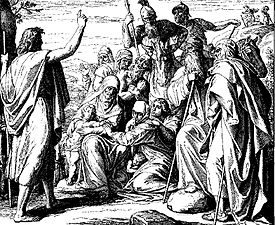- Matthew 3:2
-
 An illustration of John the Baptist preaching about the Kingdom of Heaven, from the 1875 Young People's Illustrated Bible History
An illustration of John the Baptist preaching about the Kingdom of Heaven, from the 1875 Young People's Illustrated Bible History
Matthew 3:2 is the second verse of the third chapter of the Gospel of Matthew in the New Testament. John the Baptist has just been introduced and this verse describes the message that he is preaching.
In the King James Version of the Bible the text reads:
- And saying, Repent ye: for the
- kingdom of heaven is at hand.
The New International Version translates the passage as:
- and saying, "Repent, for the
- kingdom of heaven is near."
For a collection of other versions see BibRef Matthew 3:2
Clarke notes that this is the first of twenty-nine references to the Kingdom of Heaven in the Gospel of Matthew.[1] Luke and Mark tend to prefer the term "kingdom of God." That Matthew uses the word heaven is often seen as a reflection of the sensibilities of the Jewish audience this gospel was directed to, and thus tried to avoid the word God. Most scholars feel the two phrases are theologically identical. Robert Foster rejects this view. He finds the standard explanation hard to believe as Matthew uses to word God many other time and even uses the phrase Kingdom of God four times. Foster argues that to Matthew the two concepts were different. He feels that the word heaven had an important role in Matthew's theology and links the phrase especially to Father in Heaven, which Matthew frequently uses to refer to God. Foster argues that the Kingdom of God represents the earthly domain that Jesus' opponents such as Pharisees thought they resided in, while the Kingdom of Heaven represents the truer spiritual domain of Jesus and his disciples.
Scholars believe that when it was written this phrase intended to be eschatological with the Kingdom of Heaven referring to the end times. When the last judgment failed to occur Christian scholars gradually redefined the term to refer to a spiritual state within, or worked to justify a much delayed end time. This passage presents a difficulty in this later endeavour as the phrase translated as "at hand" or "is near" both refer to an imminent event. Albright and Mann suggest better translation would state that the kingdom is "fast approaching."[2] France sees it as even more immediate suggesting that the phrase should be read as referring to "a state of affairs that is already beginning and demands immediate action."[3]
According to France the word translated as repent means "return to God."[4] Albright and Mann state that at the time a general repentance was seen as necessary before the arrival of the messiah. Clarke notes that in the Vulgate of St. Jerome the word is translated as be penitent both here and in Matthew 4:17. This translation played a central role in the development of the Catholic doctrine of penance. With the increased knowledge of Greek in the Renaissance this translation began to be criticized with Lorenzo Valla first pointing out the error. In Erasmus' 1516 translation and commentary he became the first to use repentance rather than penitence. It was from the doctrine of penitence that the concept of indulgences had grown, and these new translations played an important role in Martin Luther and other Protestant's reappraisal of these practices. Today the word is universally translated as repentance and the Catholic doctrine is grounded more in theology than in scripture.[5]
References
- ^ Clarke, Howard W. The Gospel of Matthew and its Readers: A Historical Introduction to the First Gospel. Bloomington: Indiana University Press, 2003.
- ^ Albright, W.F. and C.S. Mann. "Matthew." The Anchor Bible Series. New York: Doubleday & Company, 1971.
- ^ France, R.T. The Gospel According to Matthew: an Introduction and Commentary. Leicester: Inter-Varsity, 1985.
- ^ France, R.T. The Gospel According to Matthew: an Introduction and Commentary. Leicester: Inter-Varsity, 1985.
- ^ Albright, W.F. and C.S. Mann. "Matthew." The Anchor Bible Series. New York: Doubleday & Company, 1971.
Gospel of Matthew Preceded by:
Matthew 3:1Chapter 3 Followed by:
Matthew 3:3Categories:- Gospel of Matthew verses
- John the Baptist
Wikimedia Foundation. 2010.
